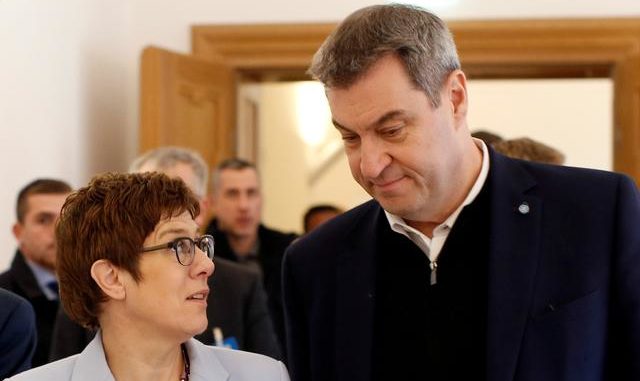
The woman who had been expected to become Germany’s next chancellor said on Monday she would not run for the top job, succumbing to a scandal involving the far-right and blowing wide open the race to succeed Angela Merkel.
Annegret Kramp-Karrenbauer is a protegee of the chancellor and leader of their conservative Christian Democrats (CDU), but has faced growing doubts over her suitability to replace Merkel, who has led Germany for 15 years but plans to stand down at the next federal election, due in autumn 2021.
Last week, Kramp-Karrenbauer’s inability to impose discipline on the conservative Christian Democrats (CDU) in the eastern state of Thuringia dealt a fresh blow to her credibility – already eroded by a series of gaffes.
RELATED COVERAGE
- Factbox: Potential candidates to succeed Kramp-Karrenbauer as German conservative leader
- Merkel protegee will remain CDU chair until a chancellor candidate is found: source
The regional CDU branch defied her by backing a local leader helped into office by the anti-immigrant Alternative for Germany (AfD), thereby shattering a postwar consensus among established parties on shunning the far-right.
“I will not run for chancellor,” Kramp-Karrenbauer, 57, told a news conference in Berlin, adding that she had made her decision “with the intention of strengthening the CDU”.
“In my view, this has no impact on the stability of the grand coalition,” she said, referring to the national coalition between Merkel’s conservatives and the Social Democrats (SPD).
Her decision not to run for chancellor leaves a big question mark over Germany’s future direction just as its economy, the world’s fourth largest, flirts with recession and as the European Union struggles to define itself after Brexit.
Merkel has loomed large on the global stage since 2005, helping to steer the EU through the euro zone crisis and opening Germany’s doors to migrants fleeing wars in the Middle East in 2015 – a move that still divides the bloc and her country.
Merkel did not seek re-election to the party chair in 2018, allowing Kramp-Karrenbauer to take the party helm with a view to boosting her profile prior to running for the chancellery. But doubts about her leadership credentials persisted.
“The separation of chancellorship and party chair, the open question around who will become the candidate for chancellor weakens the CDU at a time… (when) Germany needs a strong CDU,” Kramp-Karrenbauer told Monday’s news conference.FILE PHOTO: Bavarian State Premier Markus Soeder and German Defence Minister Annegret Kramp-Karrenbauer arrive at a news conference during a CSU party meeting at “Kloster Seeon” in Seeon, Germany, January 7, 2020. REUTERS/Michaela Rehle/File Photo
Sigmar Gabriel, a former leader of the SPD, said he now expected a snap election, but analysts played down that risk.
“This is largely a CDU internal issue,” said Holger Schmieding at Berenbank, putting the risk of the SPD quitting the coalition early at no more than 25%.
RIVALS CIRCLE
The far-right scandal in Thuringia proved to be the last straw for Kramp-Karrenbauer, whose ratings plummeted last year after a number of public gaffes, including poking fun at trans-gender people in a light-hearted carnival speech.
Kramp-Karrenbauer said she would remain party chair until another candidate for chancellor has been found. She will stay on as Germany’s defense minister.
But erstwhile rivals for the party leadership – Friedrich Merz and Jens Spahn – have been circling with intent, while Armin Laschet, premier of Germany’s largest state and a Merkel ally, did not rule out running.
Businessman Merz has quit asset manager Blackrock to focus more on politics and Spahn, now health minister, has cut a dynamic figure during the coronavirus crisis, jetting to Paris and London to coordinate the European and G7 response.
“Now’s the right time to provide impetus via economic and financial policy measures,” Merz said on Monday in a tweet.FILE PHOTO: Leader of the Christian Democratic Union CDU Annegret Kramp-Karrenbauer arrives for a statement after a party leadership meeting in Berlin, Germany February 7, 2020. REUTERS/Annegret Hilse
Being out of political office has let Merz speak his mind, keeping him in the news. A flash Forsa poll found 27% of the public thought him the best candidate, followed by Laschet on 18%.
Spahn and Markus Soeder, leader of the CDU’s Bavarian sister party, the CSU, both said they respected Kramp-Karrenbauer’s decision and stressed that the cohesion of their conservative alliance was now essential.
Laschet, who as premier of North Rhine-Westfalia, a state of 17 million people, has executive experience that other candidates lack, was more forthcoming than in the past.
Asked as he left a news conference if he was trying to avoid being asked about the Chancellorship, he replied tersely: “I’m not afraid of anything.”
Alexander Gauland, honorary chairman of the far-right AfD, said the CDU’s efforts under Kramp-Karrenbauer to ostracize his party had failed and that such a stance was unrealistic in the long-term.
“Its party base has long since recognized this and has thrown the CDU, with its policy of exclusion, into chaos,” he added.
BERLIN (Reuters) –
